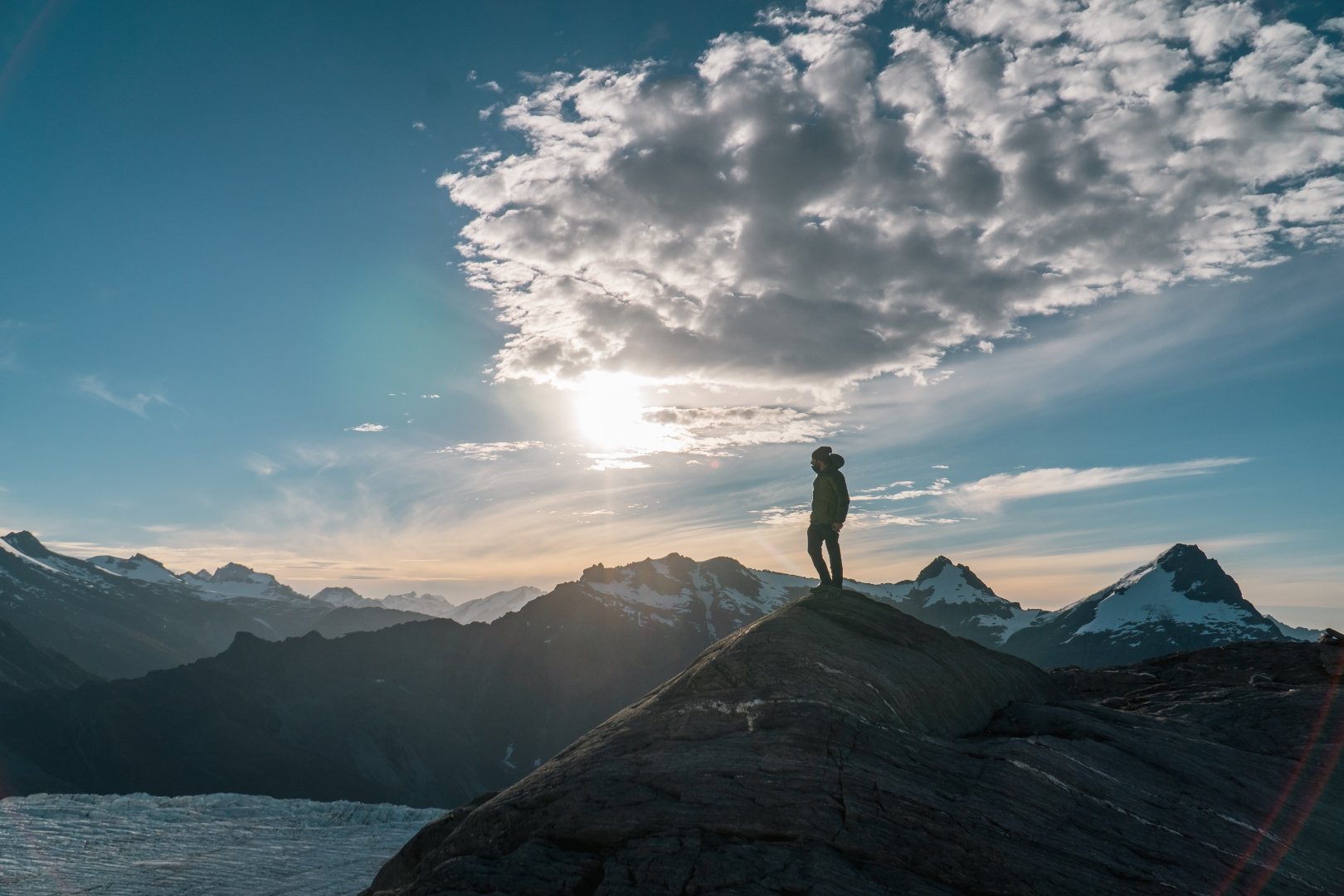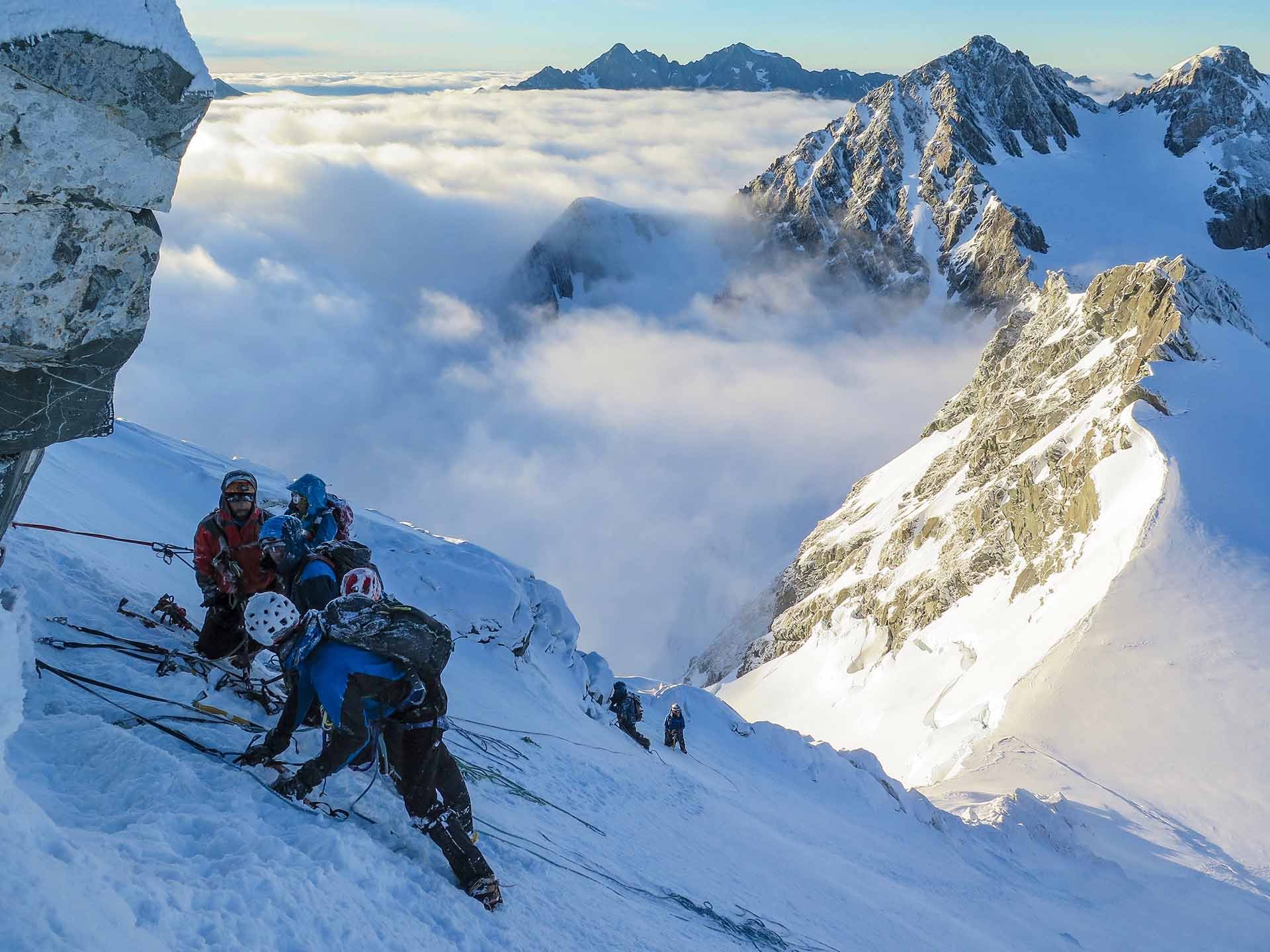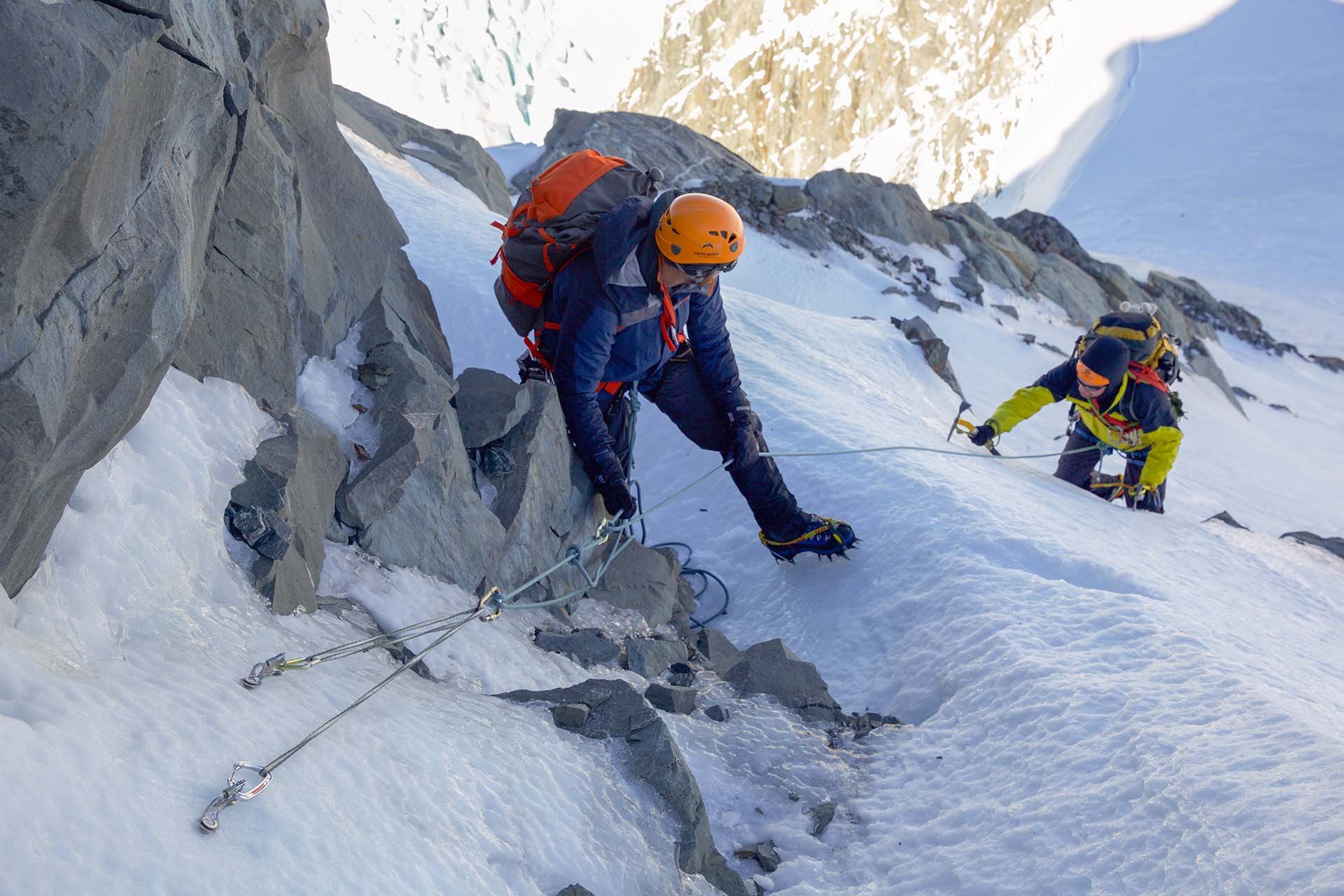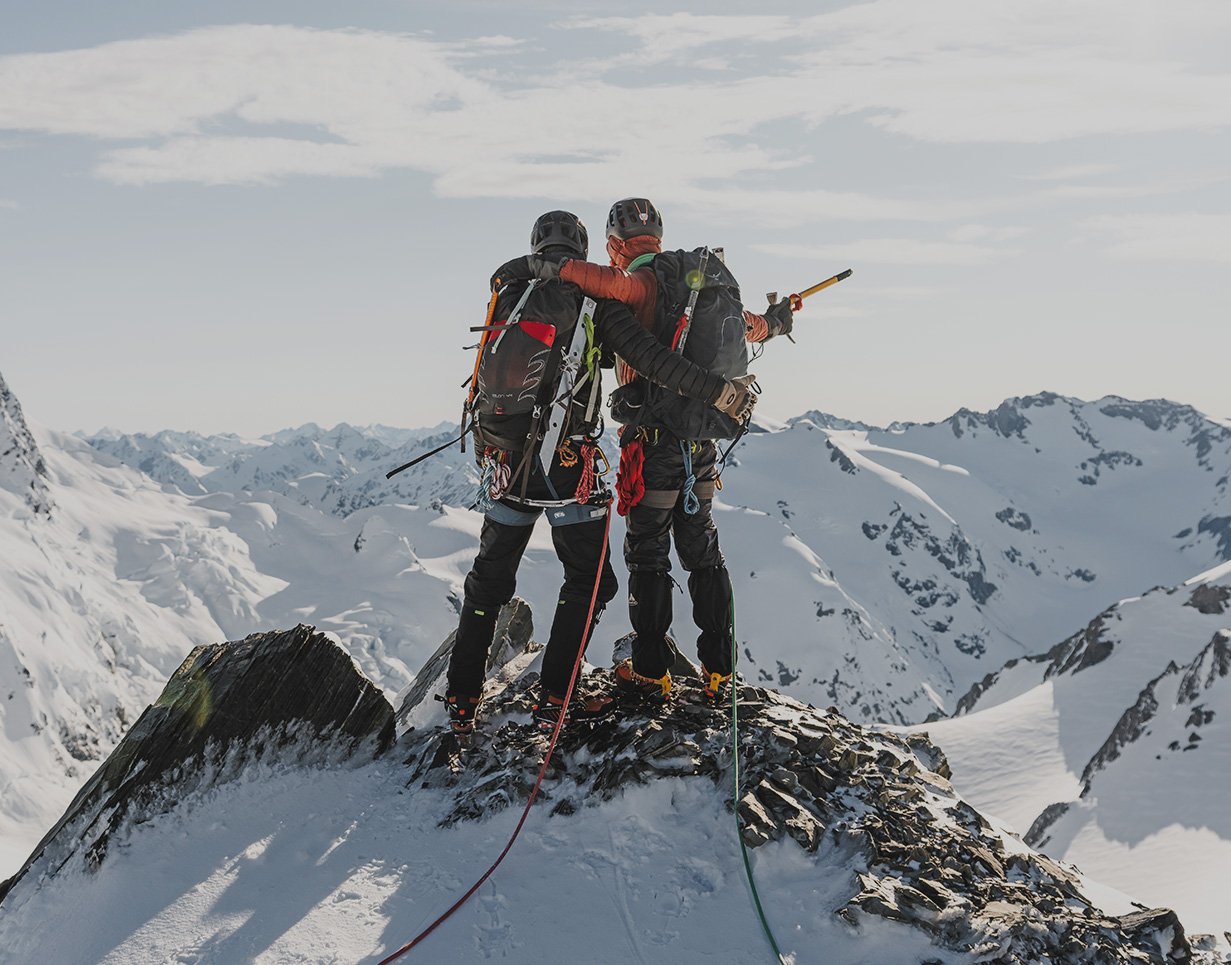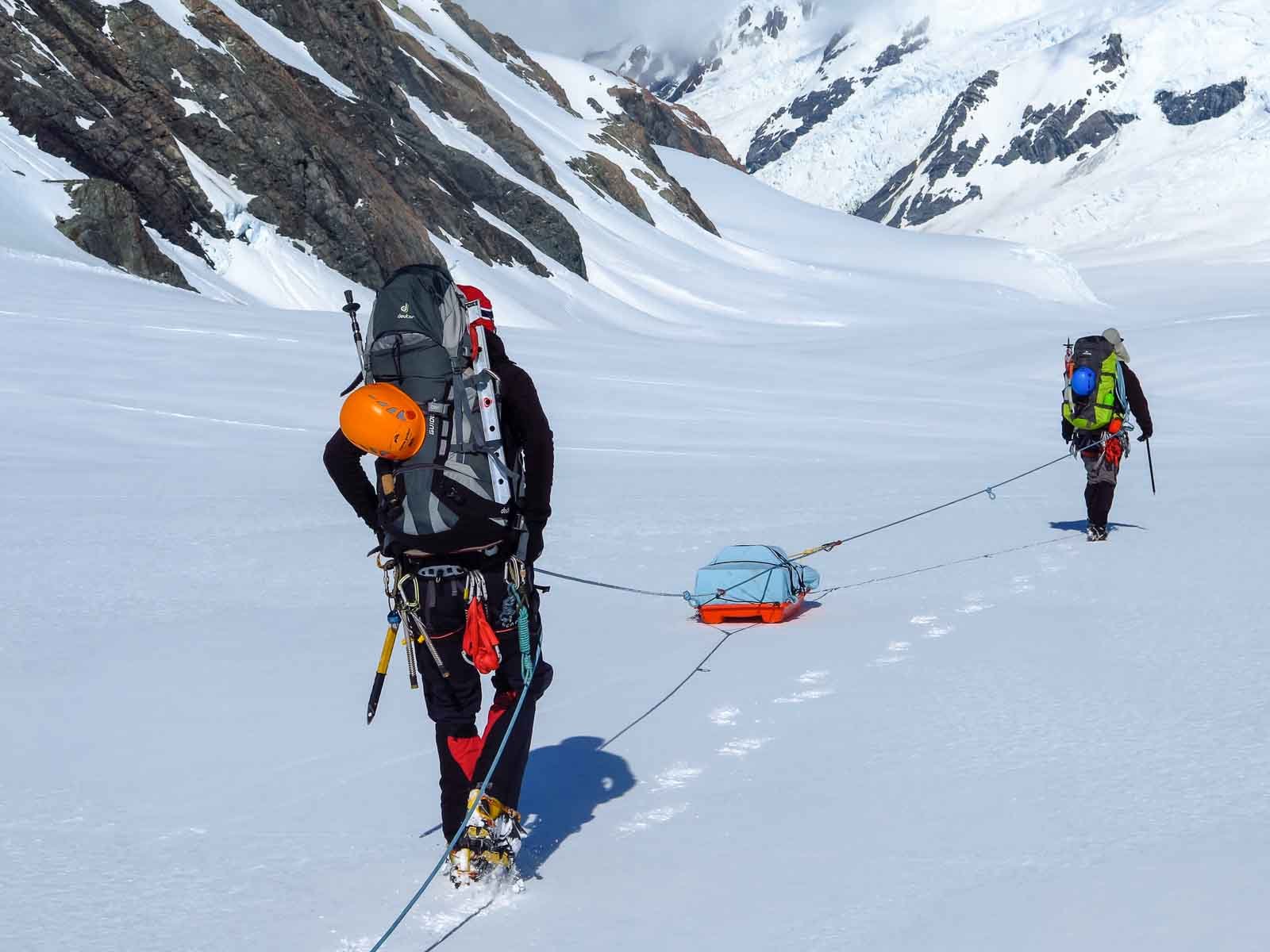
Expedition Training Course
Difficulty
Duration
6 Days
Season
October to April
Gearlist
PRICE $4,450 NZD
Big mountain training at "low" altitude
Learn the skills to climb expedition-style for your Seven Summits mission in New Zealand's Southern Alps. The Mount Cook region is a perfect training and proving ground for mountaineers. Sir Edmund Hillary trained for his successful Everest and Antarctic expeditions here, and some of the world’s most successful climbers and guides began their climbing careers at Mount Cook.
Aoraki Mount Cook area offers Himalayan vertical scale, steep glaciers, and fast-changing weather. The benefit of training here is the high-altitude feel, without the dangers of extreme cold and lack of oxygen.
Our Expedition Course base camp is at a prime location, deep in Aoraki Mount Cook National Park. We fly you in and out, to avoid heavy load carrying, and to maximise training time. Our expedition course guides are veterans of the expedition climbing world, with experience in the Himalayas, South America, Alaska, and Antarctica.
Learnings & Outcomes
What you will learn
Your course will focus on:
Camp management: tent camping, and emergency shelter options
Fixed-line techniques and alpine self-contained rope craft
Basic crampon and ice axe use
Glacier travel and self-rescue
Sled fixing and towing
How to travel and climb safely in extreme, glaciated mountain terrain
Mountain weather and snow conditions analysis
Navigation
Decision-making and risk analysis at altitude
Course Outcomes
The Expedition Training Couse will introduce you to how to travel and climb safely in extreme, glaciated mountain terrain.
By the end of the course, you should:
Have a solid base of skills for further expedition adventures
Have a sense of your own capabilities in the mountain environment
Be able to prepare for a trip
Be able to set up a base camp
Schedule and Specifics
Price: $4,450 per person
Prices are per person in NZ$
Course Dates -Summer 2026-27
| Course Dates | |
|---|---|
| ETC 1 | 13 - 18 November 2026 |
| ETC 2 | 11 - 16 December 2026 |
| ETC 3 | 11 - 16 January 2027 |
| ETC 4 | 12 - 17 February 2027 |
The package includes
Professional NZMGA/IFMGA mountain guide
All meals, including snacks and energy bars
Helicopter access and egress from the mountains
Mountain Hut fees (as required)
Local accommodation, as required
Free use of a range of technical equipment
Private Courses
If our set course dates don’t work around your travel, let us know. We will provide a guide (subject to availability).
Short-notice enquiries may be difficult to fill. We recommend making reservations well in advance
All courses start at 08:30 AM on day one and finish at 5:00 PM on the final day.
Check-in at Alpine Guides office in Mount Cook Village.
Please read our booking Terms and Conditions.
NZAC Discount
New Zealand Alpine Club Members can receive a discount on this course.
Check with us before booking, with your membership number, and we can supply a promo code.
ExperiEnce
Previous alpine climbing or rock climbing experience is not required.
The most important prerequisite is a high level of aerobic fitness, and the ability to carry a backpack. As we fly the course in and out of the mountains, extended heavy load carrying is usually not required - only when moving base camps.
Itinerary
When dealing with the dynamic mountain environment we work around prevailing weather and snow conditions, to provide the most comprehensive coverage of all course topics. We reserve the right to modify this schedule to make the best use of the weather and conditions at the time.
Day 1 - Planning. Set up. Fly in.
After meeting your guide the first part of the day involves a comprehensive gear check and organisation of equipment and clothing. Food, tents, cooking equipment, ropes and technical equipment need to be prepared for flying in.
We will establish a formal trip plan, and discuss things like weather, time, distances, camp locations, and the general strategy for the coming days, just as a group would on an expedition climb.
After lunch, if weather permits, we will fly deep into the Southern Alps to your base camp location on the upper Tasman Glacier. Given the right weather conditions, we will set up an expedition-style BC ("Base Camp") using tents and/or snow caves/natural shelter features.
If the weather is considered too limiting for learning progression, we may spend some time based out of alpine huts.
Day 2 - Camping Skills
Today we work on camp-fortifying techniques and building snow and/or block walls. On general expeditions, we use a group cook tent, which must be dug into the snow and set up at each camp as we work our way up the mountain.
Being able to efficiently and effectively dig in and reinforce camps on any expedition is extremely important to the group's safety and success. No detail is spared in covering these methods.
Group camping and cooking etiquette are put into practice. Camp duties will be assigned on a rotational basis. We will plan on moving camp at least two times on this course, to gain experience with establishing camp in different locations.
Day 3 - Climbing and Mountaineering Skills 1
Today we work on snow skills - ice axe and crampon use, and glacier travel. Snow conditions will dictate much of what training is possible. Potentially deep and soft snow conditions can make skills practice challenging. Climbers tend to wade rather than climb in these conditions.
If self-arrest and cramponing practice are not possible, we will cover more in-depth avalanche assessment scenarios. Some of the topics we cover will be:
Understanding mountain weather
Navigation and route finding
High altitude physiology and the acclimatization process
Avalanche awareness
Sled rigging.
Day 4 - Climbing and Mountaineering Skills 2
Today we use the east ridge of Mount Aylmer (2,699 m) to learn to move efficiently through a route protected by fixed lines and fixed protection. This is important for maintaining our schedule and maximising summit days on the upper mountain. We will spend the majority of this day practicing passing snow stakes/pickets, running protection, and ascending fixed lines as a rope team.
Day 5 - Crevasse Rescue Day
This involves crevasse rescue and group rescue scenarios. Crevasse rescue methods on expeditions are often different than on other mountain situations, because of:
The unique nature and size of the rope teams
The heavy backpacks and sleds each member has to tow
We will practice scenarios for individual and group rescue, as they relate to crevasse falls.
Day 6: Climbing and Mountaineering Skills 3
Conditions in the mountains can be demanding and diverse. We will likely employ a number of techniques, from snowshoeing to cramponing, as we try to ascend as high as the weather and conditions will allow. Either, climbing Elie De Beaumont (3,109 m) or Hochstetter Dome (2,827 m) will be attempted, after an alpine start.
We will then descend, pack up our camp, and fly back to Mount Cook Village. We finish up with a summary session before ending the course at 5.00 pm.
Aircraft, HUts, BAse Camp
Aircraft Use
We fly the course in and out from your mountain venue, by helicopter. The cost is included in the course fees. This avoids an arduous 2-day walk in (and a 1 to 1.5-day walk out). It also maximises climbing and training opportunities.
Mountain Hut Use
The Aoraki Mount Cook region has a network of excellent mountain huts. If weather conditions become so severe to hinder training, your course may use a hut for part of your trip. Your base camp will be located within a half day travel (on foot) to a hut.
Base Camp
As part of course training, you will help set up and maintain a working base camp (BC). This will be your working and living space for the majority of the time in the mountains. Our tent camp will be backed-up with snowcaves that you will help build and maintain. All cooking gear, utensils, and fuel are provided by Alpine Guides.
Your base camp will be in the high mountains on a glacier, usually in Aoraki Mount Cook National Park (around 2,000 metres elevation). The locations we use feature moderately difficult snow and ice peaks, crevasse fields, and seracs.
Our main camp venues are:
Murchison Glacier
Darwin Glacier
Tasman Glacier
These locations are slightly east of the Main Divide. It is often possible to be out climbing here when parties at West Coast venues (just kilometres away) are hut-bound due to bad weather from the west.
A 25% deposit is required to secure your booking

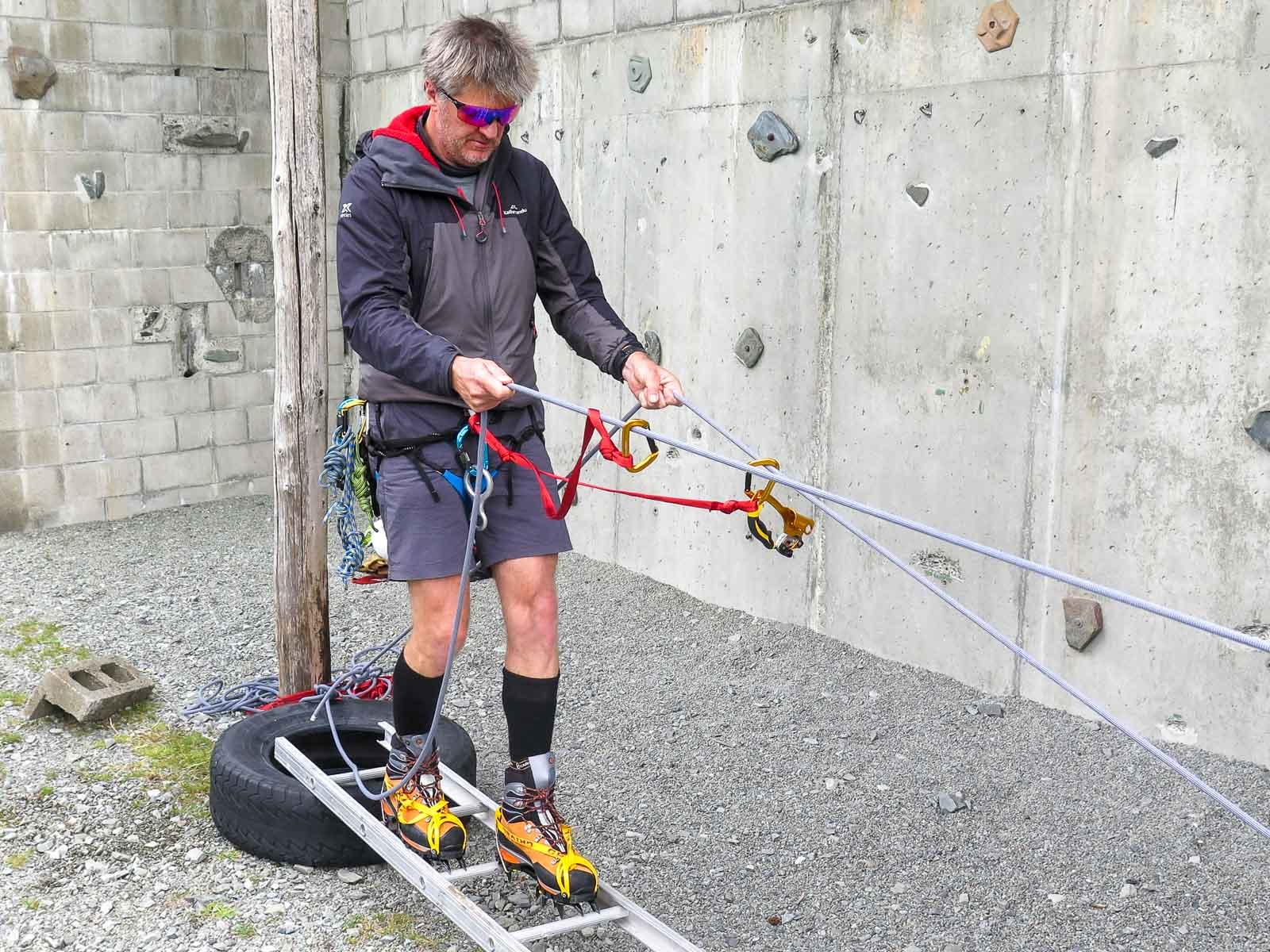
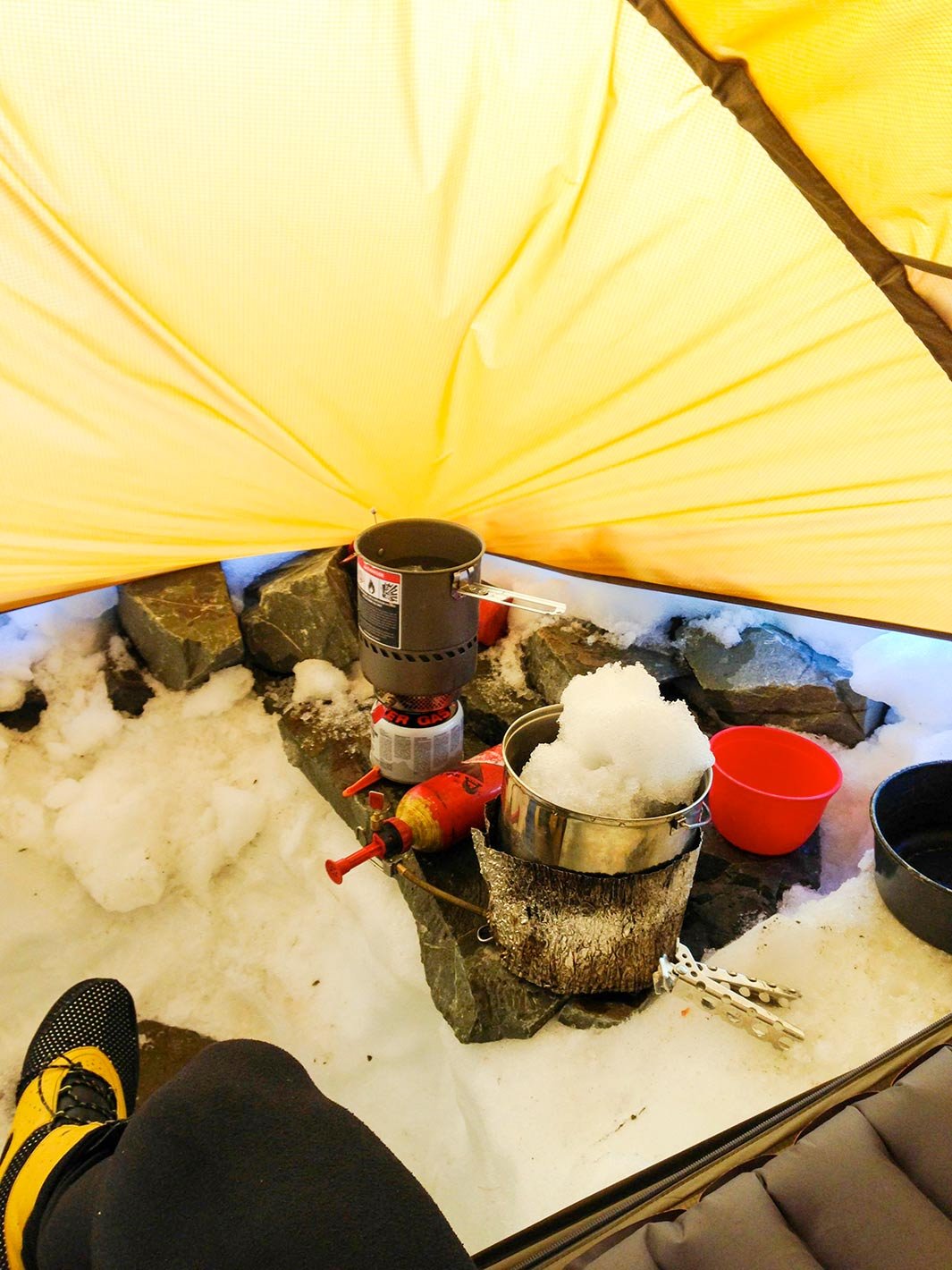
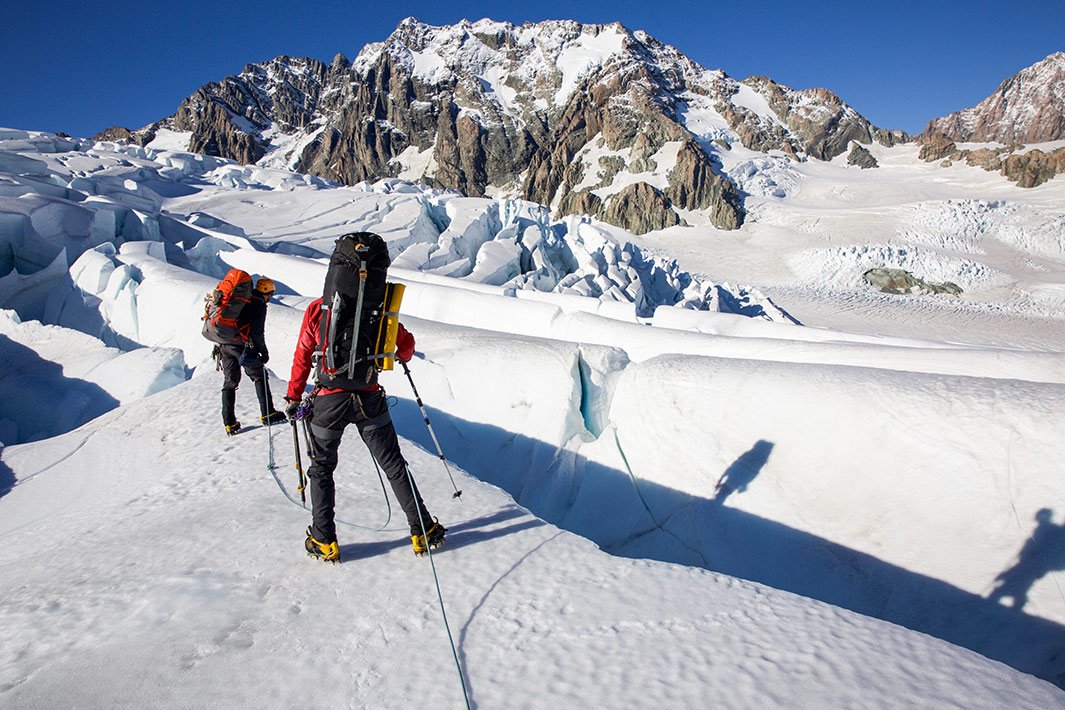
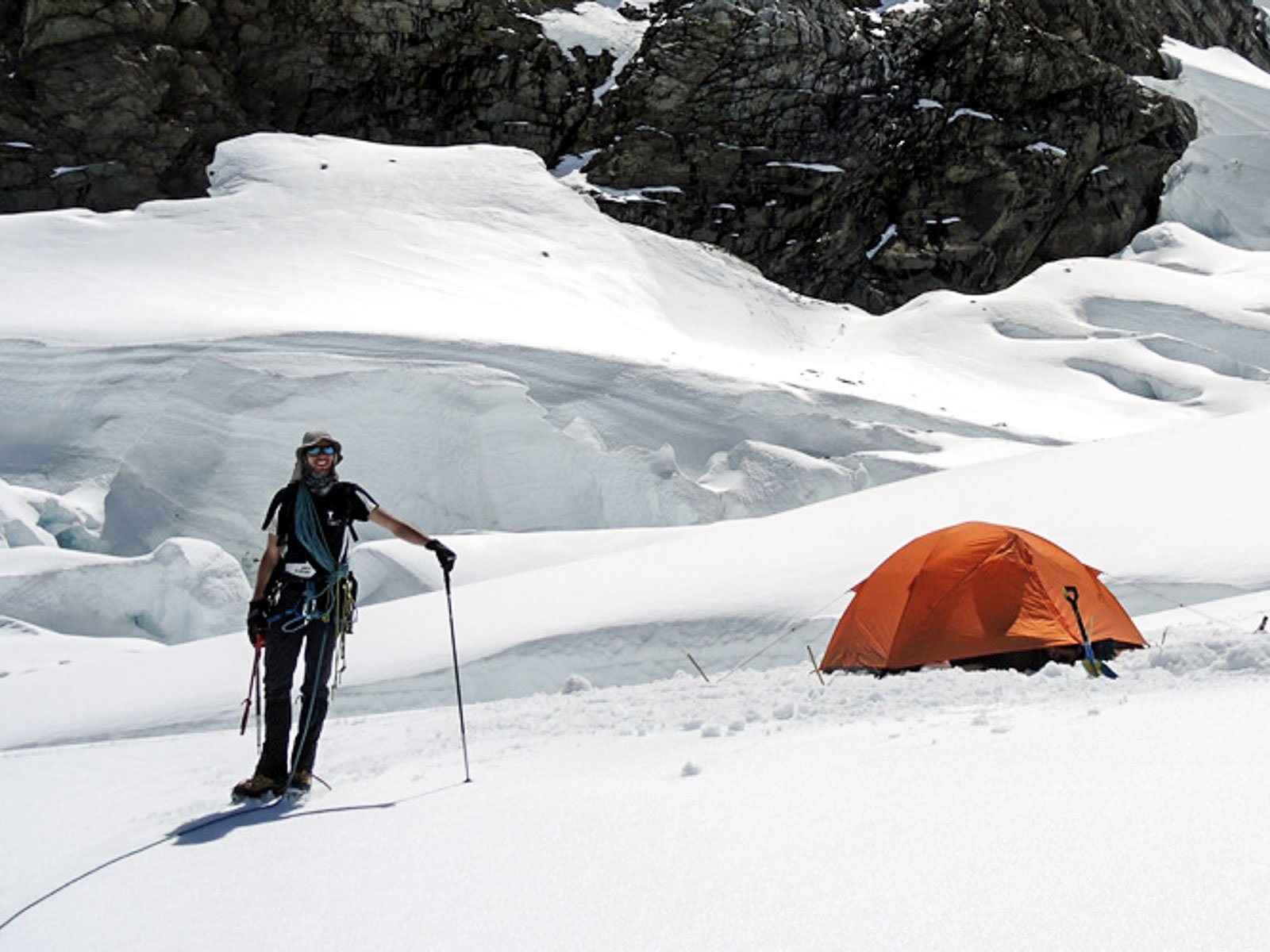
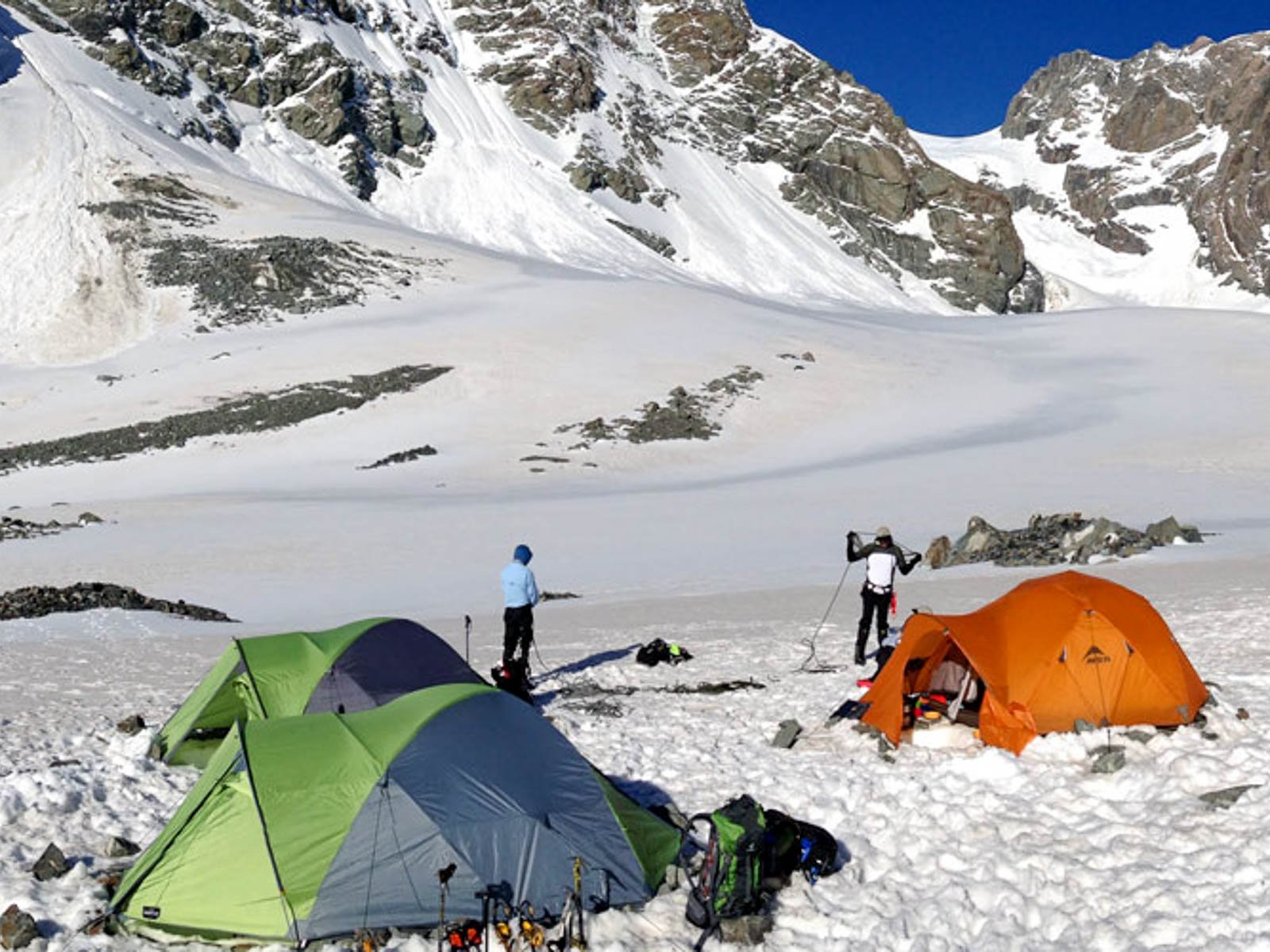
More trip ideas
Alpine Skills Course
Private Instruction Course
Glacier Training Course
